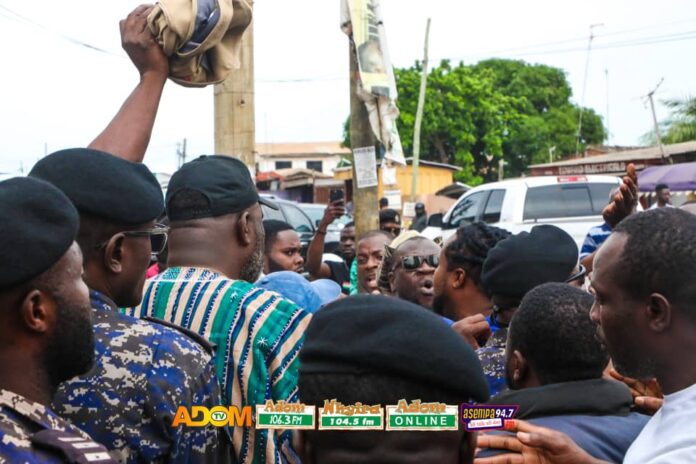Ghana, once hailed as the beacon of democracy in West Africa, now teeters on a fragile edge. The scent of political tension thickens with each election cycle.
What was once a proud example of peaceful transitions is now shadowed by mounting electoral violence, political arrogance, and institutional silence. We are a heartbeat away from chaos unless something changes and fast.
Flashpoints of Violence: A Bloody Trail
Since 1992, Ghana’s elections though largely peaceful on the surface have repeatedly been marred by violence. Below is a timeline of key incidents that tell a troubling story:
| Year | Election | Notable Incidents | Casualties |
|---|---|---|---|
| 1992 | General | Isolated violence during ballot transfers | 0 deaths |
| 2000 | General | Tensions in Tamale and Bawku; minor clashes | 3 injured |
| 2008 | General | Clashes in Akwatia, Bawku, and Ashaiman | 4 deaths, 20+ injured |
| 2012 | General | Protests after results; minor violence | 2 deaths |
| 2016 | General | Peaceful, but threats in known hotspots | 1 reported death |
| 2020 | General | Most violent since 1992; military involved | 8 deaths, 61 incidents |
| 2021 | Techiman South dispute | Security shot protesters | 2 deaths |
| 2024 | General | Tension in Ablekuma North, Techiman South, Tamale Central | 3 deaths, 15 injured |
| 2025 | Ablekuma North Rerun | Gunfire, ballot snatching, voter assaults | 2 injuries, 12 arrests |
Total Reported Deaths (1992–2025): 20+
Total Reported Injuries: Over 100
The 2020 election remains the darkest, with eight citizens killed. Yet, the silence from national leadership was deafening.
Ablekuma North: The Rerun That Nearly Broke the System
The July 2025 rerun in Ablekuma North descended into violence. Gunfire erupted near polling stations, ballot boxes were snatched in broad daylight, and an unarmed youth was beaten by alleged party thugs.
Security personnel responded late. Community leaders begged for calm. For many, it felt like the state had abandoned its duty.
How did a routine rerun descend into chaos? The answer lies in decades of political impunity, unregulated party militias, and selective justice.
The SOE Question: Are We Heading There?
Ghana has so far avoided declaring a State of Emergency (SOE) due to electoral unrest. But with dozens of flashpoints, tribal-political tension, and the weaponisation of online misinformation, we are closer to a constitutional crisis than we admit.
An SOE hands sweeping powers to the executive, suspends civil liberties, and risks erasing years of democratic progress.
To the Politicians: Step Up or Step Aside
This is not a game. People’s lives are not collateral for your ambitions.
Stop arming foot soldiers.
Stop using the youth as pawns.
Stop fanning tribal and religious divisions for votes.
Your selfishness is suffocating the republic. The power you wield was lent to you by the people. And it can be taken back.
We demand accountability.
We demand justice.
We demand leaders who value lives over votes.
To the People of Ghana: Our Peace Is Priceless
To the youth who are tired.
To the mothers who fear for their children.
To the elderly who’ve seen too much: Ghana belongs to you.
Do not let politicians weaponise your pain.
Refuse to be used as thugs.
Report threats.
Demand transparency peacefully, always.
Our ancestors dreamt of a free and peaceful Ghana.
We owe them and our children nothing less.
To the Security Agencies: Be Swift. Be Impartial. Be Brave.
The trust in our security institutions is waning and that’s dangerous.
Intervene before violence breaks out.
Protect every Ghanaian, not just political elites.
Act without fear or favour.
Silence emboldens criminals.
Indifference kills democracy.
We call on the Ghana Police Service, National Security, Ghana Armed Forces, and EC officials to rise above partisanship.
The future of the Republic depends on your vigilance.
The Bigger Picture: Reforms or Ruin
To survive this democratic cliffhanger, we must urgently pursue reforms:
-
Independent oversight of electoral violence investigations
-
Ban on party-affiliated vigilante groups
-
Swift prosecution of political crimes
-
Empowerment of electoral and judicial institutions
Ghana is bleeding not from war, but from wounds inflicted by silence, selfishness, and short-sightedness.
Let us not wait for a State of Emergency.
Let us not mourn another young voter gunned down at a ballot box.
Let us not bury democracy in its own birthplace.
We are at a crossroads.
And the direction we take now will define the next generation.
Let history remember that when Ghana stood on the edge, her people stood tall.
The writer, Shadrach Assan, is the lead producer for Adom FM’s morning show, Dwaso Nsem.
Source: Shadrach Assan
READ ALSO:



